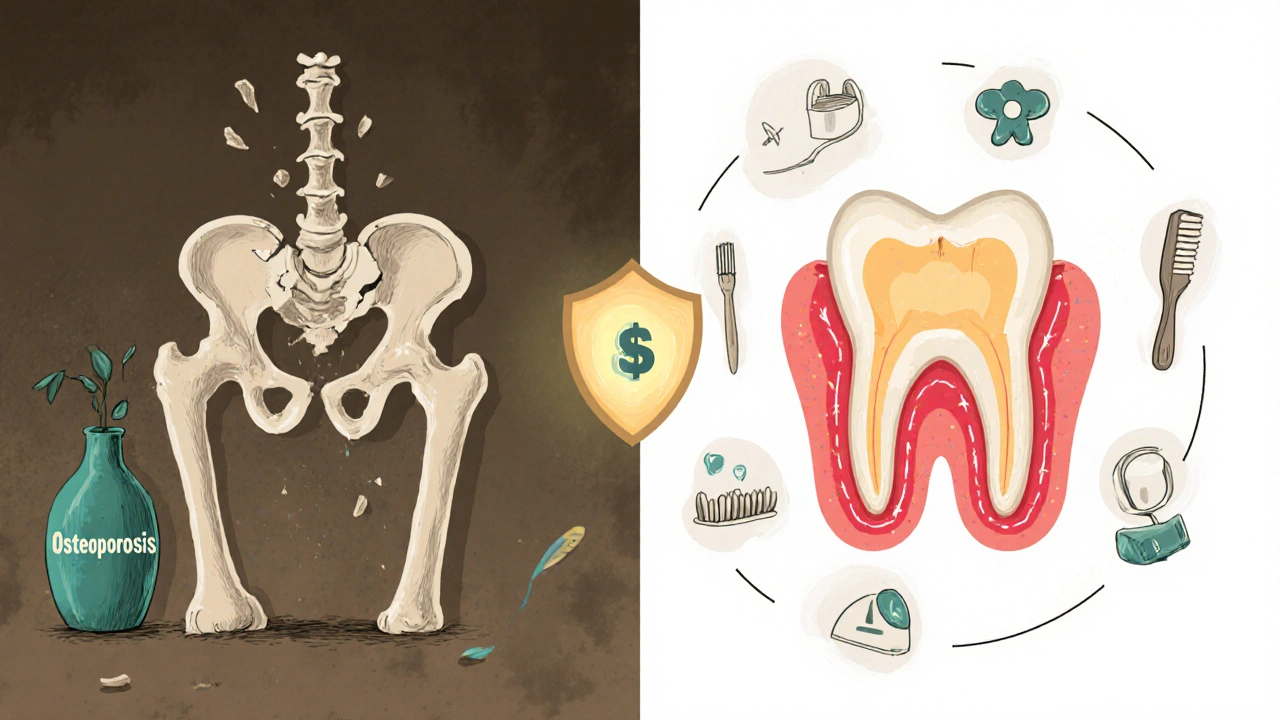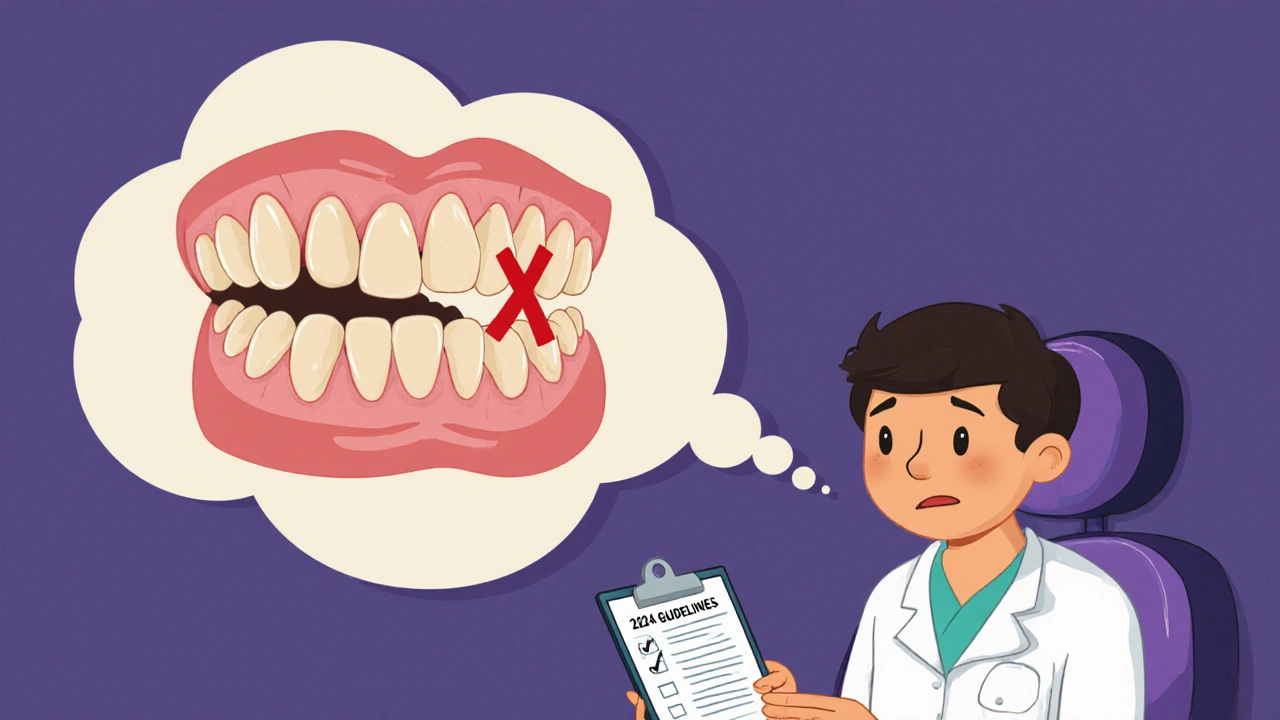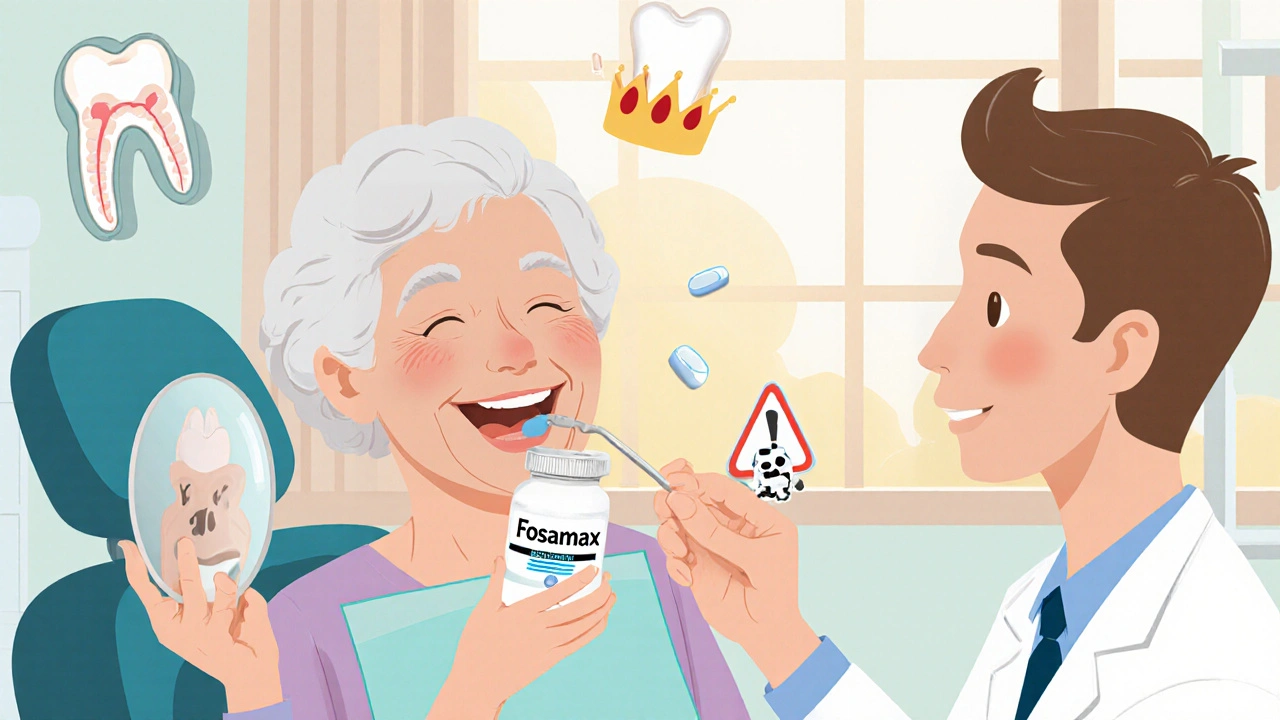When you’re diagnosed with osteoporosis, your doctor’s main goal is simple: keep your bones from breaking. Bisphosphonates like alendronate (Fosamax), risedronate (Actonel), and zoledronic acid (Reclast) have been the go-to treatment for over 25 years because they work. They cut hip fracture risk by about half and spine fractures by nearly as much. But somewhere in the fine print of the patient information leaflet, you might see a warning: jaw necrosis. It sounds scary. And it’s real. But here’s the truth most people don’t hear: for the vast majority of people taking these drugs for osteoporosis, the risk is incredibly low.
What Exactly Is Jaw Necrosis?
Medication-related osteonecrosis of the jaw, or MRONJ, happens when bone in the jaw becomes exposed and doesn’t heal. It’s not an infection you can treat with antibiotics alone. It’s not a cavity. It’s bone tissue that’s lost its blood supply and ability to repair itself - usually because the drugs that protect your spine and hips are also slowing down your jaw’s natural healing process.
This isn’t something that happens overnight. It typically shows up months or even years after a dental procedure like a tooth extraction, or sometimes just from chronic gum disease. The jaw is unique. It has a much faster bone turnover rate than your hip or spine - up to 10 times faster. That means bisphosphonates build up there more than anywhere else in the body. Add in bacteria from your mouth, pressure from chewing, and thin gum tissue, and you’ve got the perfect storm for this rare complication.
How Common Is It Really?
Let’s put numbers to fear. For someone taking oral bisphosphonates like Fosamax for osteoporosis, the risk of developing MRONJ is about 0.7 cases per 100,000 people each year. That’s less than one in a hundred thousand. To put that in perspective, you’re more likely to be struck by lightning in a given year.
Compare that to cancer patients getting high-dose IV bisphosphonates - they face a risk that’s 100 to 1,000 times higher. But even then, most of those cases happen in people who’ve had multiple rounds of chemo, radiation, or surgery. For osteoporosis patients? The data from a 2011 study of 260,000 people showed no increased risk at all compared to those not taking the drugs.
Denosumab (Prolia), another osteoporosis drug, carries a slightly higher risk than oral bisphosphonates - about 1.7 to 2.5 times more. But again, that’s still extremely rare. In fact, the American Dental Association and the American Association of Oral and Maxillofacial Surgeons both agree: the risk of a broken hip or spine from untreated osteoporosis is far greater than the risk of jaw necrosis.
Who’s Actually at Risk?
It’s not about the drug alone. It’s about what’s already happening in your mouth. Most cases of MRONJ in osteoporosis patients follow dental surgery - especially tooth extractions. But here’s the key: if you have healthy gums and teeth before starting treatment, your risk drops dramatically.
Studies show that patients with existing gum disease, loose teeth, or untreated infections are far more likely to develop complications. One dentist in Florida who helped discover this link back in 2003 put it bluntly: “If a lot of patients had gum disease or tooth infection before starting treatment, that could have raised the rate of ONJ.”
That’s why the standard advice is simple: get a dental checkup before you start bisphosphonates. Fix cavities. Treat gum disease. Get dentures adjusted. Remove problematic teeth. Do this before you take your first pill. After that, keep up with regular cleanings. Don’t skip them because you’re afraid.

What About Stopping the Drug?
Some patients and even some dentists think the answer is to stop bisphosphonates before dental work. But that’s risky too.
A major 2024 study tracked over 600 patients and found that stopping IV zoledronic acid for more than a year reduced jaw necrosis risk by 82%. Sounds great, right? But here’s the catch: those same patients saw their fracture risk jump by 28%. That’s not a trade-off you want to make lightly.
For oral bisphosphonates, the data is even clearer: stopping them doesn’t lower jaw risk much, and it definitely doesn’t make your bones safer. These drugs stay in your skeleton for over 10 years. So even if you quit after five years, your bones are still saturated with the drug.
The bottom line? Don’t stop your medication without talking to your doctor. If you need a tooth pulled, your dentist and doctor can work together. They might delay the procedure, use antibiotics, or take extra care - but they won’t make you stop your osteoporosis treatment.
What Should You Do If You’re Already on Bisphosphonates?
- Keep your mouth healthy. Brush twice a day. Floss daily. See your dentist every six months - no exceptions.
- Don’t wait for pain. If you notice a sore spot, exposed bone, or a tooth that won’t heal after extraction, tell your dentist immediately. Early detection is everything.
- Don’t avoid dental care. Many patients stop going to the dentist because they’re scared. That’s the worst thing you can do. Infections in the mouth can spread and cause bigger problems. Your dentist knows how to manage this.
- Don’t panic over a single symptom. A small sore or bleeding gum doesn’t mean you have MRONJ. It’s usually just gum disease. Only exposed bone that lasts more than eight weeks counts as a diagnosis.

Why Do Dentists Get Nervous?
Here’s a hidden problem: many dentists are terrified of MRONJ. Not because they don’t know the numbers - but because the consequences are so severe when it happens. One case can cost thousands in surgery, take years to heal, and sometimes leave permanent damage.
So some dentists refuse to pull teeth or place implants in patients on bisphosphonates. Others overprescribe antibiotics or delay care. That’s not based on science - it’s based on fear.
Patients report frustration: “My dentist said he couldn’t do my crown because I’m on Fosamax.” Or, “I needed a root canal, but he wouldn’t touch it.” These stories are real. But they’re not necessary. The guidelines are clear: you can have most dental work done safely if you’re healthy and your doctor knows what’s going on.
Is There a Better Alternative?
There are other osteoporosis drugs - denosumab, romosozumab, teriparatide. But none of them are safer when it comes to jaw necrosis. Denosumab carries a higher risk. Romosozumab is newer and has limited long-term data. Teriparatide doesn’t cause MRONJ, but it’s expensive, requires daily shots, and is only approved for two years.
Bisphosphonates still win on three things: proven results, low cost, and decades of safety data. Alendronate has been used by millions. The Fracture Intervention Trial showed that 11 years of treatment reduces hip fractures by 55%. That’s not something you give up lightly.
What’s changing is how we use them. Doctors are starting to think in terms of “drug holidays” - stopping after 3-5 years for low-risk patients. But that’s not for everyone. If you’ve had a fracture before, you probably need to stay on it longer.
What’s Next?
Researchers are working on ways to predict who’s most at risk. One promising idea: testing urine for bone breakdown markers. If your body is still breaking down bone quickly, you might be safer on bisphosphonates. If it’s already slow, maybe you don’t need them anymore.
By late 2025, we should have more data from clinical trials that will help doctors personalize treatment. The goal isn’t to scare people off bisphosphonates - it’s to use them smarter.
For now, the message is clear: if you have osteoporosis, take your medication. Don’t let fear of a rare complication stop you from protecting your bones. But do take care of your mouth. See your dentist. Fix problems early. And talk to your doctor before making any changes.
The real danger isn’t the drug. It’s doing nothing at all.
Can bisphosphonates cause jaw necrosis even without dental surgery?
Yes, but it’s rare. Most cases follow tooth extraction or other invasive dental work. However, a small number of cases occur without any known trigger - usually in people with pre-existing gum disease, poor oral hygiene, or other health conditions like diabetes. The jaw’s high bone turnover and constant exposure to bacteria make it uniquely vulnerable.
Is MRONJ reversible?
In early stages, yes - with aggressive treatment. Stage 1 MRONJ (exposed bone without pain or infection) can often heal with antibiotics, mouth rinses, and avoiding trauma. Stage 2 and 3, which involve infection or bone fractures, may require surgery. Healing can take months to over a year. Complete recovery is possible, but it’s not guaranteed. The key is catching it early.
Should I stop taking bisphosphonates before a tooth extraction?
For oral bisphosphonates, stopping is not recommended - the drug stays in your bones for years, and stopping doesn’t lower risk much. For IV bisphosphonates like zoledronic acid, some doctors may suggest a 3-6 month break if you’ve been on it for more than 3-4 years, but only if your fracture risk is low. Never stop without consulting both your doctor and dentist. The risk of a new fracture often outweighs the small benefit.
Do all bisphosphonates carry the same risk?
No. Intravenous bisphosphonates (like zoledronic acid) carry a higher risk than oral ones (like alendronate). Among oral bisphosphonates, nitrogen-containing types (alendronate, risedronate) are more potent and have longer half-lives, but the actual risk difference between them is minimal. The biggest factor is dosage and duration - not the specific brand.
How do I know if I have MRONJ?
Look for exposed bone in your mouth that lasts more than eight weeks. It may be painless at first, but later can cause swelling, pain, infection, or loose teeth. If you’ve had a tooth pulled and the socket isn’t healing, or you notice bone sticking out through your gums, see your dentist right away. Don’t wait. Early diagnosis improves outcomes.
Are dental implants safe if I’m on bisphosphonates?
It’s possible, but riskier. Most experts recommend avoiding implants in patients on long-term bisphosphonates unless absolutely necessary. If you already have implants, they’re generally safe as long as your gums are healthy. The real danger is placing new implants - the bone may not integrate properly. Always tell your implant dentist you’re on bisphosphonates.








Peter Aultman
November 14, 2025 AT 15:48Been on Fosamax for 6 years and my dentist never blinked an eye. Just keep up with cleanings and tell them you're on the med. No big deal. My hips thank me every morning.
gent wood
November 14, 2025 AT 16:59I get why people panic-jaw necrosis sounds like something out of a horror movie. But the real horror is breaking your hip at 72 and never walking right again. I had a fracture at 68. I’d rather have a dead tooth than a dead hip. This stuff works. Just don’t skip dental checkups. That’s the real key.
Dilip Patel
November 15, 2025 AT 10:18USA doctors love to scare people with rare risks so they can sell you more drugs. In India we just take the pill and brush teeth. No drama. You think your jaw is special? It’s not. Stop overthinking. The bone is stronger than your fear.
Barry Sanders
November 16, 2025 AT 03:16Let’s be real-this whole post is a pharma-funded PR stunt. They know the risk is low, but they also know people will ignore it. That’s the whole point. You’re being manipulated into staying on a drug that’s been around since the 90s because no one wants to admit we need better options.
Jane Johnson
November 16, 2025 AT 09:48While I appreciate the data presented, I must emphasize that the emotional weight of this condition cannot be quantified by statistical averages. Many patients experience profound psychological distress upon learning of this potential outcome, regardless of its rarity.
kshitij pandey
November 17, 2025 AT 21:23My uncle in Delhi took Fosamax for 8 years. He had a tooth pulled and nothing happened. He still walks 5km every morning. Don’t let fear stop you from living. Your bones need you. Your mouth needs care. That’s it. Simple.
Brittany C
November 19, 2025 AT 07:53The pharmacokinetics of bisphosphonates in bone matrix are well-documented, and the localized osteoclast inhibition in high-turnover regions like the mandible creates a unique pathophysiological vulnerability. However, the risk-benefit calculus remains overwhelmingly favorable for low-to-moderate risk osteoporotic populations.
Sean Evans
November 19, 2025 AT 17:57They don't want you to know this, but bisphosphonates are basically chemical castration for your jaw. 😈 You think you're protecting your spine? You're just trading one slow death for another. And your dentist? They're scared because they’ve seen the horror stories. Don't be the next one.
Anjan Patel
November 20, 2025 AT 08:59Everyone’s scared of the jaw thing, but nobody talks about how your spine breaks while you’re asleep on the couch. One fall. One wrong turn. And you’re done. I’d rather have a dead tooth than be trapped in a wheelchair. This isn’t a choice-it’s survival.
Scarlett Walker
November 20, 2025 AT 10:18I was terrified after reading the leaflet. But I went to my dentist, got everything cleaned up, and started the med. Two years later, my bones are stronger than ever. Don’t let fear make you ignore the real threat: osteoporosis.
Sean Hwang
November 21, 2025 AT 14:08My grandma took this for 10 years. She never had a problem. She just went to the dentist every 6 months like clockwork. That’s all you need. Stop scrolling, start brushing.
Hrudananda Rath
November 21, 2025 AT 15:04It is, with profound regret, a matter of lamentable consequence that the pharmaceutical industry continues to obfuscate the true nature of this iatrogenic pathology under the guise of statistical normalization. The moral imperative to prioritize bone integrity over dental preservation remains fundamentally compromised.
Brian Bell
November 23, 2025 AT 08:02My dentist actually called my doctor before pulling my tooth. They worked together. No drama. Just common sense. You don’t need to be scared-you just need to be informed.
Chris Ashley
November 23, 2025 AT 14:52My dentist refused to do my crown because I’m on Fosamax. So I went to another one. They did it in 20 minutes. People are overreacting. Just find a good dentist and stop listening to fearmongers.